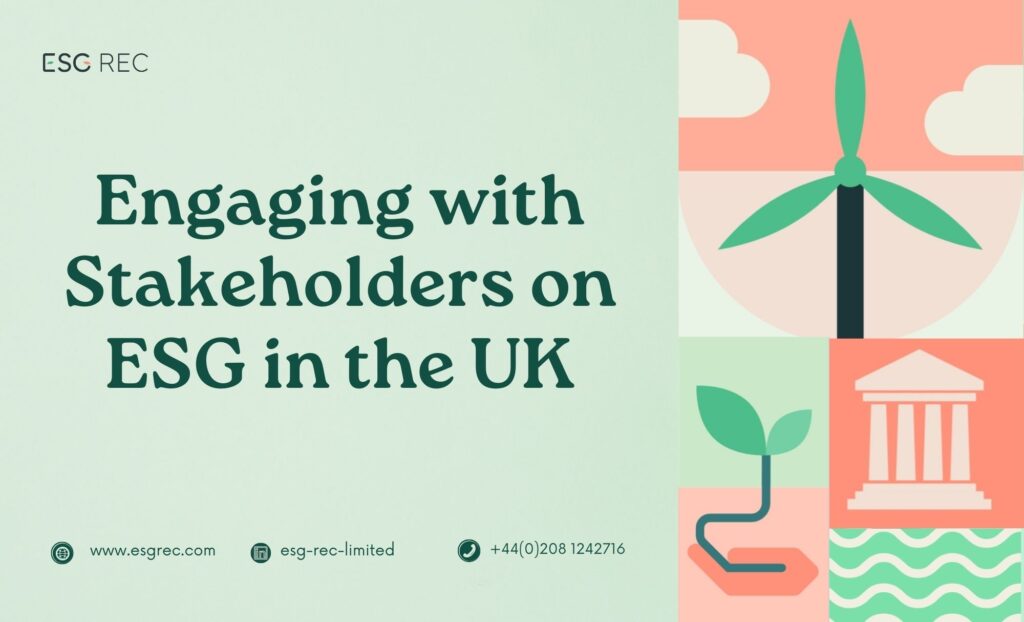
In today’s UK business landscape, effective Environmental, Social, and Governance (ESG) engagement is not just a corporate responsibility—it’s a game-changer for building trust, fostering loyalty, and ensuring long-term success. Companies that proactively communicate their ESG strategies and performance can strengthen relationships with key stakeholders, including investors, employees, customers, and local communities.
Building Relationships with Investors
UK investors are increasingly prioritising ESG factors when making decisions. Transparency in ESG reporting, clear sustainability goals, and measurable outcomes can attract investment and enhance credibility. Regular engagement through ESG reports, investor meetings, and sustainability disclosures, in line with the UK Stewardship Code and Financial Reporting Council (FRC) guidelines, showcases commitment and accountability. Companies that excel in ESG reporting stand out in a competitive investment landscape.
Engaging Employees in ESG Initiatives
Employees are a company’s most valuable asset in driving ESG progress. By fostering a culture of sustainability and social responsibility, UK businesses can boost employee engagement, morale, and retention. Providing ESG-related training, encouraging employee-led sustainability initiatives, and maintaining open communication channels can empower employees to contribute to the company’s ESG goals, aligning with UK employment and corporate governance standards. Engaged employees become advocates for sustainability both inside and outside the organisation.
Customer Involvement in ESG
UK consumers are more conscious of corporate responsibility than ever before. Companies that embed ESG principles into their business strategy can build stronger customer loyalty and trust. Transparent communication about sustainability efforts, ethical sourcing, and corporate social responsibility initiatives, in line with UK regulations such as the Green Claims Code, can influence purchasing decisions and brand perception. Consumers are increasingly willing to support businesses that align with their values—making ESG a powerful differentiator in today’s market.
Strengthening Community Relations
A strong ESG strategy includes active community engagement. Supporting local initiatives, addressing social and environmental concerns, and maintaining open dialogue with community members help build positive relationships. Companies that align their ESG goals with UK community needs can create shared value and long-term impact, particularly by engaging with local councils, charities, and grassroots organisations. A company seen as a responsible corporate citizen gains credibility and trust in the local and national market.
Effective ESG Communication
Clear and consistent communication is the foundation of successful stakeholder engagement. Utilising sustainability reports, social media updates, corporate websites, and ESG-focused events ensures that stakeholders remain informed and engaged. Authenticity and transparency in ESG messaging, while adhering to UK corporate governance requirements, are crucial for maintaining trust and credibility. Companies that effectively communicate their ESG impact not only build brand loyalty but also inspire others to take action.
Engaging with stakeholders on ESG issues in the UK requires a strategic and transparent approach. By fostering relationships with investors, employees, customers, and communities, companies can drive meaningful impact and enhance their overall ESG performance. The future belongs to businesses that prioritise sustainability, social responsibility, and ethical governance.
Looking to Build an ESG-Driven Workforce?
At ESG REC, we specialise in connecting businesses with top talent who are passionate about sustainability, ethical governance, and social responsibility. Whether you’re looking for ESG professionals to strengthen your team or seeking expert recruitment solutions tailored to your organisation’s ESG goals, we’ve got you covered.
Visit www.esgrec.com to discover how we can help you build a workforce that drives real ESG impact!
